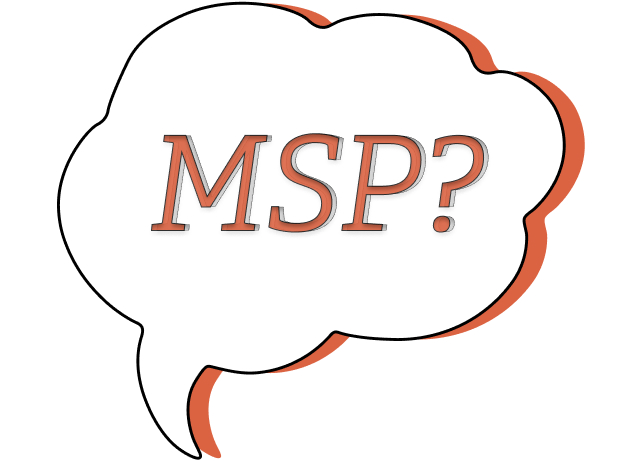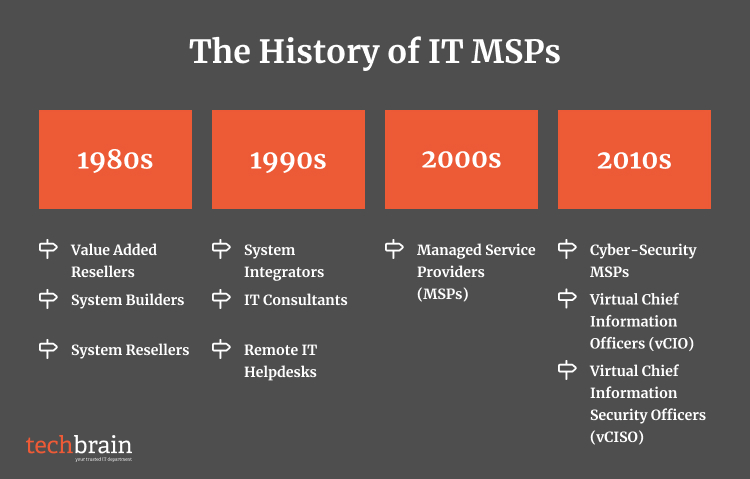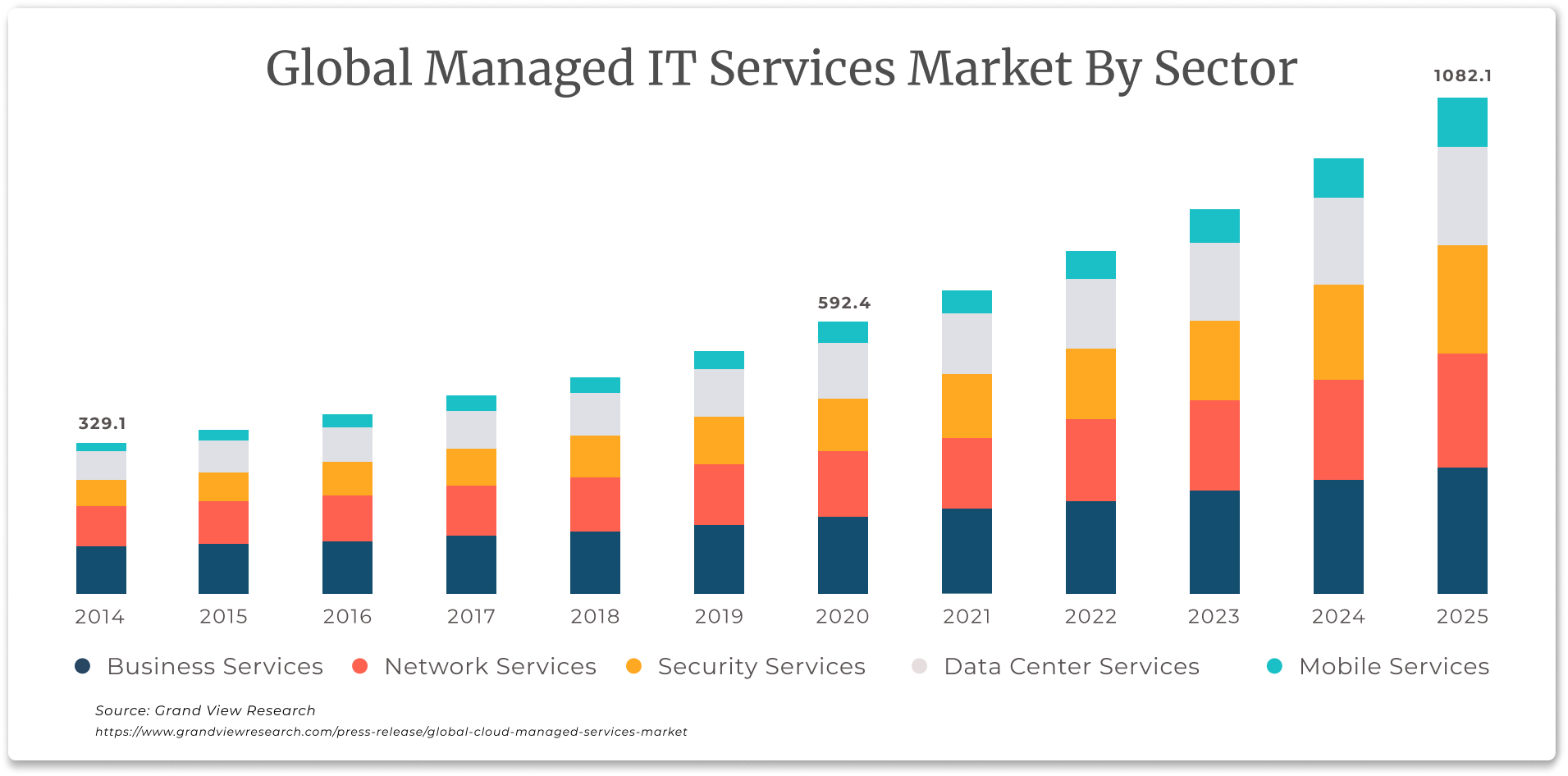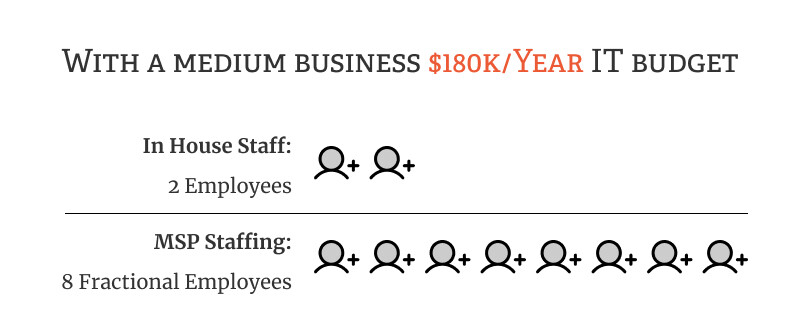In this article
In today’s digital world, technology has crept into every aspect of business, from operations to marketing to customer service. Technology is more important to a company’s success and competitive advantage than ever.
But at the same time, managing complex end user systems and ensuring they meet the ever-changing needs of a business while staying secure and ahead of the competition can be a daunting task.
That’s where Managed Services Providers (MSPs) come in. These IT companies are a one stop shop for managing, securing and enhancing a company’s IT infrastructure, so business owners and managers can avoid service interruptions and focus on their core business instead.
Definition of a Managed Services Provider (MSP)
So, what is an MSP?
Managed Services Providers (MSPs) are companies that provide managed IT services to businesses on an ongoing basis. MSP stands for Managed Services Provider. These providers manage the IT infrastructure and systems of their clients which can include services such as network management, cyber security, data backup and recovery, cloud services and more.
MSPs work to proactively manage and maintain these systems so businesses can focus on their core operations while having access to up to date information technology and high-quality IT support.
MSPs operate on a subscription model where the client pays a regular fee for their services. The specific services provided are defined in a service-level agreement (SLA) between the MSP and the client.
Brief History & Evolution of MSPs
Managed Service Providers (MSPs) didn’t emerge overnight. The precursor to today’s MSPs were the Application Service Providers (ASPs) that popped up in the late 1990s. ASPs provided businesses with remote application hosting services. However, their offering was limited and reactive, mainly following the break/fix model where IT issues were addressed only when something broke down.
The limitations and challenges of the break/fix model led to a demand for a more proactive approach to IT management. This resulted in the rise of early MSPs, mainly focused on Remote Monitoring and Management (RMM) of servers and networks. MSPs could identify potential issues and fix them before they resulted in system downtime or business disruption and provide the outsourced IT expertise to guide an IT strategy.
Over the years, technological advancements such as Cloud Computing, Internet of Things (IoT) and Artificial Intelligence (AI) have significantly impacted the evolution of MSPs. These technologies have expanded the scope of services MSPs offer and shifted the role MSP play into an even more strategic role, from managing infrastructure and applications to cyber security, data analytics, vCIO, vCSIO and more.
The Role of an MSP in Business Operations
In today’s business environment, the role of an MSP goes beyond problem solving or troubleshooting; they are business expertise. This is because most businesses, whether small or large corporations, startup or well established, operate within a technological ecosystem that is complex, rapidly changing and critical to daily operations.
An MSP provides bespoke IT support to a business. They are a full IT department, handling everything from daily tech issues to strategic technological planning.
A good MSP relationship is that of a trusted partner, working alongside businesses to leverage technology in ways that align with their goals, improve their processes and ultimately, drive their success.
Let’s look at some of the key roles an MSP can play in seamless business operations:
Infrastructure Management
An MSP helps businesses build, manage and optimise IT infrastructure. This can include servers, networks, data storage, mobile device management and applications, so they work together to support business operations.
Data Management
Data is the lifeblood of modern businesses and MSPs play a critical role in managing, backing up and ensuring the integrity of this data. They also help businesses use data analytics for informed decision making.
Cyber Security
With cyber threats becoming more sophisticated, managed security service providers add a vital layer of defence, implementing security protocols, monitoring systems for threats and ensuring compliance with various regulatory requirements. They can also provide cyber awareness training to instil more secure staff cyber habits or security as a service for an end to end cyber security solution.
Technical Support & Troubleshooting
MSPs can provide 24/7 help desk support to resolve any tech issues that may impact operations. This can be software issues or hardware malfunctions, all fixed quickly to minimize downtime.
Support for Specialist Software Platforms
Industry specific needs, businesses often use specialist software platforms for their daily operations. These specialized systems can be Enterprise Resource Planning (ERP) tools, Customer Relationship Management (CRM) software, industry specific solutions such as Electronic Health Records (EHR) for healthcare or Learning Management Systems (LMS) for education.
Cloud Services & Digital Transformation
MSPs guide businesses through the complex process of digital transformation, helping them move to the cloud, adopt new technologies and optimize their operations in the digital landscape.
Remote Management
MSPs implement specialist software platforms to automate various functions. These platforms include Remote Monitoring and Management (RMM) tools and Professional Services Automation (PSA) applications. RMM software allows technicians to monitor, maintain and patch IT systems – this includes networks, servers, desktops and mobile devices.
Vendor Management
MSPs manage relationships with various IT vendors, negotiate contracts and ensure businesses get the best value from their IT investments.
Strategic IT Consulting
Perhaps the most important role an MSP plays is that of a strategic advisor. They can help shape the technology roadmap of a business, make strategic recommendations that align with business objectives and future proof the company’s tech infrastructure.
Business Communications
MSPs keep business communications running smoothly. This can involve managing email systems, facilitating remote work solutions or integrating business phone solutions, all to enhance collaboration, connectivity and productivity.
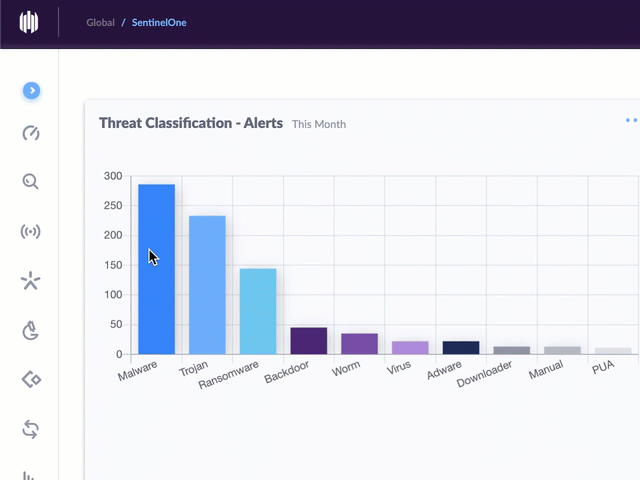
The Benefits of Using an MSP
Maintaining an up-to-date IT infrastructure, staying on top of rapid technological changes, mitigating cyber threats and managing a maze of data and applications requires expertise that many businesses can’t build and maintain in-house.
That’s where Managed Services Providers (MSPs) come in, bridging the gap between the technological needs of a business and the resources available to meet those needs. By outsourcing IT management to an MSP, businesses can access specialized expertise and the latest technology, without the financial and logistical burden of building and maintaining a full IT department.
More than just an outsourcing solution, MSPs are strategic partners that can navigate the complex and ever-changing tech landscape on behalf of the business. Their role is to keep IT processes running smoothly and business continuity, implement forward thinking tech solutions and protect the business from emerging cyber threats.
In terms of cost effectiveness, MSPs offer a compelling proposition. With an IT managed service provider, businesses can reduce or even eliminate the costs of recruiting, training and retaining a large in-house IT team. Add to this the benefit of predictable, regular expenses through a subscription-based model and the financial benefits of partnering with an MSP become clear.
Let’s dive deeper into the benefits businesses can get from an MSP:
Cost Savings/ Predictable IT Budget
With their subscription-based model, MSPs allow businesses to predict their IT costs, avoid unexpected expenses and help them better plan and manage their budgets.
Access to IT Expertise & Human Resources
MSPs give businesses access to a team of IT professionals with a wide range of skills and experience, without the overhead of hiring and maintaining an in-house IT team.
Scalability and Flexibility
As businesses grow and their IT needs change, MSPs can scale their services up or down to match.
Productivity and Efficiency Gains
By taking care of IT management, MSPs free up businesses to focus on their core operations, leading to productivity and efficiency gains.
Proactive Approach to IT Management
MSPs take a proactive approach, identifying and fixing IT issues before they impact business operations.
Enhanced Security and Compliance
MSPs provide robust cyber security and ensure businesses comply with industry regulations and standards such as the Australian Government’s Essential 8 cyber security guidelines.
24/7 Monitoring and Support
With MSPs, businesses have the peace of mind of 24/7 IT monitoring and support, so any issues are identified and fixed quickly.
Access to Latest Technologies
MSPs stay up to date with the latest technologies and can advise businesses on which ones will benefit their operations, often providing strategic recommendations and platform/process upgrades as part of their managed service.
MSP Pricing Model & Cost Benefit Analysis
Managed Services Providers (MSPs) use several pricing models depending on the services they offer, their market and their strategic goals. The choice of pricing model also depends on the Service Level Agreement (SLA) between the MSP and the client.
Here are some common MSP pricing models:
- Per-Device Pricing Model: In this model, the client pays a flat fee for each device managed. This model is simple and easy to understand for both the MSP and the client.
- Per-User Pricing Model: Here, the client pays a flat fee for each end-user in their business. This model covers all the IT needs of the user, regardless of the number of devices they use.
- All-Inclusive or Flat-Rate Pricing Model: In this model, the MSP charges a flat monthly fee for all their services, so clients have a simple and predictable billing process.
- Tiered Pricing Model: Different levels of service are offered for different prices. A basic level may include simple monitoring services, while higher levels could include issue resolution, security services and strategic consulting.
Pricing Comparison with In-house IT Teams
Managing an in-house IT team can be a big cost for a business. These costs include salaries, benefits, training, recruitment and overhead. In contrast, using an MSP can often be a more cost-effective solution.
In-house IT teams have a vested interest in the organisation and its success, as their job stability is directly tied to the company’s wellbeing. They are familiar with the company’s IT infrastructure and the day-to-day operations. This knowledge can be an advantage when dealing with complex issues.
However, it can also create a risk of complacency or a lack of innovation, as these teams can sometimes become too focused on maintaining the status quo and less open to new technologies or processes.
Managed service providers have exposure to a wide range of IT environments due to their work with multiple clients. This allows them to bring a broader perspective, innovative solutions and experience with the latest technologies to the table.
An MSP’s flat monthly fee is usually predictable and can be planned for in advance and brings a range of expertise that might be cost prohibitive for a business to maintain or build in-house. They can also scale their services as needed, providing flexibility and responsiveness to it needs that might not be possible with an in-house team.
Pricing Comparison with Traditional IT Break/Fix it Providers
Traditional IT service providers charge on a per-incident basis. While this might seem cost effective in the short term, in the long term it can lead to unpredictable costs and budget overruns.
MSPs take a proactive approach, monitoring systems continuously and fixing issues before they become major problems. This reduces downtime and results in predictable, regular expenses that can be budgeted for. This predictability combined with the range of services MSPs offer often makes them a more cost-effective solution than traditional break/fix providers.
Traditional IT models have little to no incentive to improve efficiency in the long term with profit tied firmly to the number of issues that arise, proactive solutions and processes tend to be dis-incentivised.
Choosing the Right Managed Services Provider (MSP) for Your Business
Choosing the right MSP is a big decision that can have a big impact on your IT operations and by extension your entire business. It’s more than just comparing services or prices. To make an informed decision businesses should consider several factors including their specific IT needs, the MSP’s technical capabilities, customer service and their approach to security and innovation.
Assess Your Specific Needs
The first step in choosing an MSP is to understand your business’s specific IT needs. This involves identifying where your current IT setup falls short, the level of support you need, your business’s growth plans and any industry specific technology requirements.
Evaluate MSP’s Expertise and Resources
Once you have a clear understanding of your needs you can evaluate potential MSPs to see how well they align. This includes their technical expertise, the breadth and depth of their services, their experience in your industry and the human resources they have to meet your needs.
Examine Customer Service Quality or Net Promotor Score
Customer service is a key factor to consider. This includes responsiveness, the availability of support (e.g. 24/7 support or remote support in your time zone), the MSP’s approach to problem solving and their willingness to understand and adapt to your business needs.
Scrutinise their Approach to Security
With the growing complexity and sophistication of cyber threats an MSP’s approach to security is a critical consideration. Ask potential MSPs about their security protocols, how they handle threats, the measures they take to ensure data privacy and compliance and how they will keep your business safe.
Are they Current with the Latest Technology?
Technology is a fast-changing field. Your MSP should be able to keep up with the latest and greatest. Ask potential MSPs about their commitment to innovation, how they stay current with the latest technology and how they will benefit your business.
Dealing with an IT Crisis
IT crises such as data breaches or major system failures can stop your business in its tracks. Understanding how an MSP would handle such a crisis is important. Ask about their disaster recovery plans, response times and how they will minimise the impact on your business operations.
Planning the Transition
Once you’ve chosen an MSP the transition should be planned carefully to minimise disruption. This includes setting a timeline, outlining responsibilities, establishing communication channels and preparing staff for the change. A good MSP will guide you through this process to ensure a smooth and efficient transition.
Choosing the right MSP is a big process that requires a clear understanding of your business needs and careful evaluation of potential providers. By considering these factors you can ensure you choose an MSP that meets your current IT needs and supports your future business goals.
As Technology Evolves, So Does the MSP
In a digital world the importance and benefits of managed services providers cannot be overstated. MSPs enable businesses to use technology effectively, improve efficiency, secure their operations and focus on their core functions.
By choosing the right MSP businesses can turn their IT into a strategic asset. Looking ahead as technology continues to evolve the role of MSPs in business will only grow and providers like TechBrain are here to help you stay ahead.

